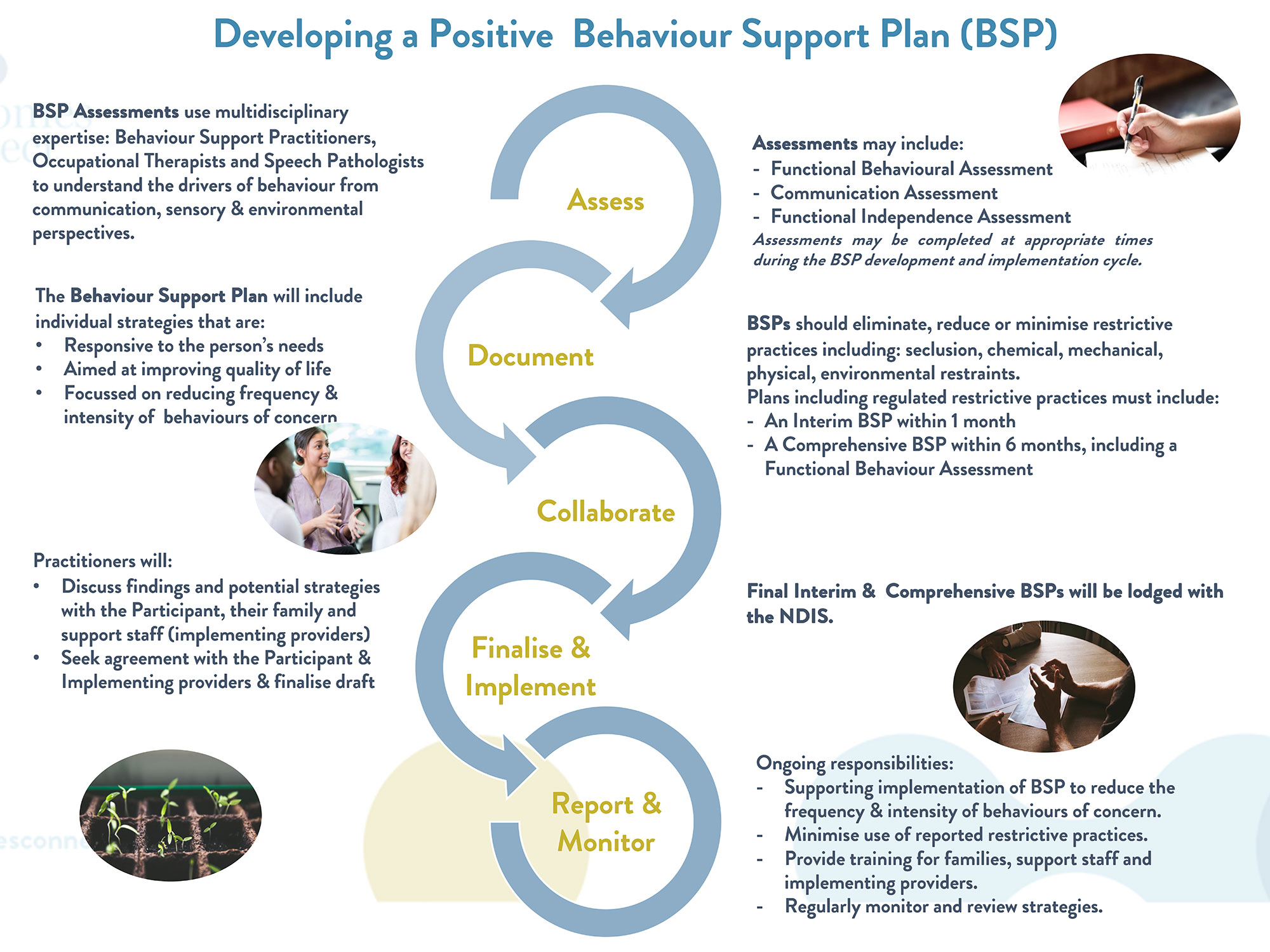Who We Help
We understand that behaviours of concern can negatively impact on the quality of life for individuals, their families and the people around them.
Outcomes Connect Australia provides Positive Behaviour Support services to both children and adults with high and complex needs.
We have specialised skills in supporting people with:
- Neurological, Cognitive and Intellectual Disabilities
- Autism Spectrum Disorder
- Dual diagnosis
We strive to make meaningful and lasting change for people with disability. We do this by building genuine relationships with participants, their families and support networks.
We work with our participants to build meaningful working documents and implement behaviour support strategies to support an increase in positive behaviours, participation, and independence in daily life.
Let’s get started:
Our Positive Behaviour Support Model
Our model
We offer Positive Behaviour Support services to NDIS participants and their support networks in the community where they live, work, learn and play. We do this because this is what the evidence tells us works best.
Our Positive Behaviour Support Model encompasses the multidisciplinary expertise of Behaviour Support Practitioners, Occupational Therapists and Speech Pathologists. We first seek to understand the drivers of behaviours of concern from a communication, sensory and environmental perspective. We then work collaboratively with our participants, families, and their support networks to make a real and lasting difference.

Our experienced Behaviour Support Practitioners utilise the PBS Capability Framework (NDIS Quality & Safeguards Commission) to support our ongoing professional development.
Behaviors of Concern
Outcomes Connect Australia clinicians understand behaviours of concern and the impact they have on quality of life for the participant, their families and their support networks.
We build genuine working relationships with our participants, their families and support networks, working with people in their own environment to understand their unique needs and the current behaviours of concern.
Our unique multidisciplinary approach encompasses Positive Behaviour Support, Occupational Therapy and Speech Pathology, to allow us to deeply review the function of these behaviours from a communication, sensory and environmental perspective.
This forms the foundation of a Positive Behaviour Support Plan aimed to decrease the intensity and frequency of behaviours of concern in daily life.
Behaviour Support Plans
Our Positive Behaviour Support practitioners develop Interim and Comprehensive Behaviour Support Plans, in line with NDIS Quality and Safeguards Commission timeframes and requirements.
We undertake formal and informal assessments to understand the function of behaviours, including Functional Behavioural Assessments (FBAs).
Using specialised Speech Pathology and Occupational Therapy we work to understand functional communication, sensory and environmental needs.
We will then work with our participants, their families and support networks to assist with a deeper understanding of a behaviour, its purpose and how behaviours of concern can be minimised by identifying and meeting those underlying needs.
Our approach provides participants with easily interpretable, quick reference ‘Behavioural Snapshots’ to refer to in order consistently support them in optimally meeting their needs.
Outcomes Connect Australia Practitioners have specialised skills in understanding Regulated Restrictive Practices and ensuring they are documented and used appropriately to support the safety of the participant, their families and support networks. We work towards reducing and phasing out the use of any Regulated Restrictive Practices wherever possible.
Implementation of Plans
Outcomes Connect Australia Practitioners use evidence-based proactive strategies to implement Positive Behaviour Support Plans.
We support participants with building their capability and skills to engage in meaningful activities, in line with their interests.
Our Practitioners work intensively with the participants support network, to ensure strategies are consistently understood and implemented. As part of this we provide easily interpretable, quick reference ‘Behavioural Snapshots’ to refer to, which consistently assist the participant to optimally meet their needs with more appropriate behaviours.
In order to enable continued growth and improvement we ask for permission to record data to inform changes to Plans and to continue to modify our approach to reach our Participants goals.
